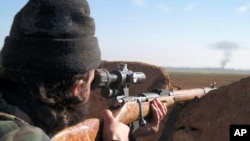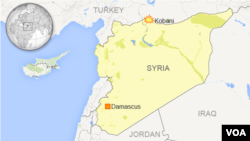Fighting on several fronts against multiple foes, Islamic State is showing signs of straining under manpower shortages. In addition to redeploying fighters from Syria to Iraq to try to counter an offensive by Iraqi government forces and Shia militias in Anbar province, Islamic State is pressing tribesmen and locals in towns it controls to enlist in the defense of the self-styled caliphate.
The jihadist army has a large territory to defend, stretching from the northeastern outskirts of Syria’s Aleppo, east to Mosul in Iraq. Activists and local residents in northern Syrian towns controlled by the Islamic State group, formerly known as ISIL, say the terrorist group's forces have thinned noticeably, with many fighters having transferred to the Iraqi battlefront.
“On the streets you used to see lots of them, patrolling and mounting checkpoints, but now there are fewer of them and not so many checkpoints,” says Abdul, a student who travels back and forth between Turkey and his hometown of Al-Bab, 30 miles to the northeast of Aleppo.
Considerable pressure
In Raqqa, the caliphate’s defacto capital, political activists opposed to IS have also noticed signs of fewer fighters on the streets and say there is considerable pressure now being placed on the local population to put their people forward for enlistment. “They need soldiers to go to Iraq,” says Abu Mohammed, an activist with the opposition network named Raqqa is Being Slaughtered Silently. “They are using all the means they can to persuade people to join — from money offers to threats and prisoners are being press-ganged.”
He says Islamic State manpower challenges started to show earlier this year when the terror group finally had to admit defeat in its months-long assault on the Syrian border, and mainly Kurdish, town of Kobani. “They lost a lot of fighters there and it clearly hit their morale as well.”
Many of the reinforcements Islamic State sent to Kobani during the months-long siege of the mainly Kurdish town that finally ended in January after stiff resistance by the Kurds and airstrikes by the U.S.-led coalition reportedly were Syrian and Iraqi youngsters. Islamic State has also increased efforts to recruit children for the so-called “cubs of the caliphate.” Abu Mohammed says just in the last month 117 more children joined up in Raqqa.
The push to enlist children is partly a consequence, Syrian rebel commanders think, of the high death toll the militants have suffered as a result of the prolonged struggle for Kobani and battles in Iraq and northeast Syria with the Kurds and Shia militias.
'Coalition airstrikes killed 8,500 IS fighters'
In March, General Lloyd Austin, commander of U.S. Central Command, told a congressional panel that the coalition’s bombing campaign against the militants that started in September had likely killed upwards of 8,500 fighters. Some analysts question that estimate, arguing the U.S. has no comprehensive on-the-ground damage assessment capability to help calculate the casualties inflicted by airstrikes with any precision.
Even so, Rami Abdurrahman, who heads the London-based Syrian Observatory for Human Rights, a pro-opposition monitoring network of political activists, believes the group has suffered significant casualties, estimating that IS lost more than a thousand fighters at Kobani alone.
Last week a statement purportedly from the IS leader, Abu Bakr al-Baghdadi, appeared on jihadist forums and Twitter feeds calling on all emirs and fighters in Syria’s provinces to volunteer to fight in Iraq. In the announcement al-Baghdadi appears specifically to call for those willing to be suicide bombers-fighters. He asked for “religiously dedicated, patient ones, and war experts who don’t look back, fight and don’t lay down their weapons until they get killed or God grants them victory.”
According to analysts at the Combating Terrorism Center at the United States Military Academy at West Point, Daniel Milton and Muhammad al-Ubaydi: “The first potential take away from the statement is that it included an injunction for those who wanted to volunteer to report within 48 hours. The short temporal expiration date on this order suggests a certain urgency in the request. Given the time it will take to organize and deploy fighters, this suggests that IS sees the next several weeks in both Al-Anbar and Salah ad Din (provinces) as critical.”
The analysts argue, “The dynamic nature of the conflict both in Iraq and Syria is forcing the Caliph (al-Baghdadi) into a delicate balancing act regarding which front of the conflict is more important and how to avoid alienating local leadership.”
More Islamic State recruitment propaganda videos have also been appearing showing fighters pledging themselves to defend the group seized in Iraq last summer after a lightning offensive. Late last month a video from Raqqa showed a group of fighters pledging allegiance to al-Baghdadi and proclaiming, “There is no return after today.” According to the video, the fighters were Iraq-bound.
Syrian rebel commanders maintain that despite Western media reports of the continued flow of IS foreign recruits, they believe fewer foreigners are either volunteering or managing to cross the border from Turkey into Syria.





